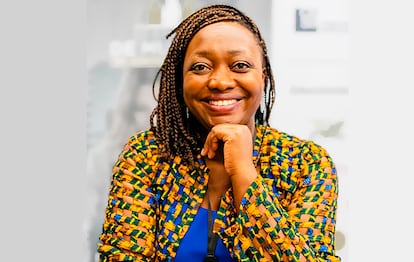Paula Moreno: “Culture and technology are key to racial equity”
Colombia's first Afro minister created the Manos Visibles Corporation, which has trained more than 27,000 leaders. She is working to turn Quibdó and Medellín into 'Black Smart Cities'

In these days when Chocó is under water and the problems of violence seem to repeat themselves in a loop, Paula Marcela Moreno, who was the first Afro minister in Colombia, remembers a conversation a few years ago with the Nobel Prize winner in economics James Robinson when visiting this department, one of the most paradoxical in the country: with enormous wealth and diversity, it is at the same time mired in poverty and inequality. “‘There are people who benefit from the fact that Chocó does not work, it is on purpose,’ he told me,” she says at the Bogotá headquarters of the Manos Visibles Corporation, the foundation she created 15 years ago.
Moreno is determined to change that assumed fate of Chocó and go against the current. Hold a technology meeting in a department where there is not always connectivity, where many municipalities have intermittent power? She says yes. Why can't we talk about technology, robotics, innovation? Why does exclusion continue? Why do they continue to see us as different? She asks herself. With that determination, she says, Quibdó, the capital of Chocó, will become “the first Black Smart City in Colombia.” For three days, starting today, it will be the epicenter of AfroInnovaTech, which brings together 12 technological leaders from the African diaspora to talk about racial equity through technology.
At 28, Paula Marcela Moreno (Bogotá, 1978) became the first Afro-descendant prime minister in Colombia, a country so accustomed to war that when her aunt Cecilia heard the news on television, she ran through the neighborhood in Santander de Quilichao (Cauca) saying: “They appointed Paula, they appointed Paula,” but her cousins were scared because what they understood was “they killed Paula, they killed Paula.” She tells the anecdote in her first book, The Power of the Invisible, in which she wanted to record what it means to be a black woman in politics, in the best style of the female political leaders of other countries of which we do have memory.
She says that, as a minister, she received enormous violence, headlines asking where she had come from, why her?, and few who responded to her ideas and proposals. “For no one it was either obvious or natural that I was the minister (...) it was expected that in a couple of months I would fail,” she says in her book, where she remembers her mother and her aunt, who forged her character and guided her path by making loans so that she could train as an industrial engineer and later go on to study at Cambridge or Yale.
After leaving office and tired of leadership processes going unnoticed, she created the Manos Visibles Corporation to bring many of them out of anonymity. “There are a number of leaderships on the street that are not being narrated; there is extraordinary value in the invisible leaderships of everyday life,” she also wrote in her most recent book Dreaming the Impossible. In a world that seems to be collapsing, these Afro leaders are “hands that build containment walls so that society does not overflow,” she says. Fifteen years later, they have trained more than 27,000 people and have provided scholarships for young Afro people who have studied master's and doctoral degrees abroad.
In Colombia there are at least 9 million black men and women, but as Moreno says, “they do not appear in the registry beyond the quick and light image of enslavement or sporting successes.” Therefore, her life project is to contribute to racial equality and to change the realities and narratives about Afro people.
How do you fight racial discrimination? Paula Marcela is convinced that culture and technology are the key. “There is an enormous and sustained power in culture that can help generate change,” she says, and displays a huge poster called Vanguardia Étnica Cultural, where more than 40 Afro artists, designers and writers can be seen. She refers to the prominence of Afro people in literature, film and art and to the fact that the content does not obey external and exotic readings. In Colombia, only nine black writers appear in the catalogues of the major publishing houses. “We did not exist in the intellectual world of this country and everything starts with the word,” she adds. Now, several of these writers and filmmakers will participate in the Hay Festival in Cartagena.
“Narratives have a lot of impact. The fact that most black people in this country are recorded or made famous when someone white writes about us is perverse and shameful. We have agency and we have a voice,” says Moreno, and gives a fact that reveals everything that is missing: of the 1,500 film projects supported by Colombia’s Film Law in the last twenty years, only 5 have been by black directors. “Cinema is a country’s photo album and so we have family members who are either poorly portrayed or portrayed from a very external perspective. Cinema perpetuates views.” Now, a series written by Moreno will be shown on television about María Roa, the first African-American woman president of Colombia’s domestic workers’ union.
Something similar happens in technological developments. “Racial justice ranges from issues such as facial recognition because black people are registered as a fingerprint, machines are not adapted to our skin, to issues such as algorithmic racism and Artificial Intelligence.” That will be precisely one of the topics they will address in Quibdó where they have focused on a program called Valle del Naidí that trains 1,600 boys and girls from the Pacific and Medellín in STEAM (Science, Technology, Engineering, Art and Mathematics) and robotics skills.
It has been 17 years since Moreno was in the centre of politics and he does not think he will return to it: getting votes seems boring to him; he prefers to seek funding for projects like the ones he is currently doing. He recognises that there has been progress in Afro and female leadership in politics and says that in 2010 when Manos Visibles started he could not have imagined that three Afro women who had passed through the Corporation would later become ministers. “It is undeniable that there is progress, millions of black girls and boys today can think that seeing someone Afro in a government is no longer an exception; that they are citizens who play in this country and that they do not have to cry or kneel to say we are here. It is not a favour,” he says. But he does not forget that there are still anachronistic elites and an entrenched discrimination that makes it difficult for further progress to be made. “When I attend events of our elites I think how lacking in sophistication and in tune with current times they are. They are tremendously parochial,” he concludes.
Tu suscripción se está usando en otro dispositivo
¿Quieres añadir otro usuario a tu suscripción?
Si continúas leyendo en este dispositivo, no se podrá leer en el otro.
FlechaTu suscripción se está usando en otro dispositivo y solo puedes acceder a EL PAÍS desde un dispositivo a la vez.
Si quieres compartir tu cuenta, cambia tu suscripción a la modalidad Premium, así podrás añadir otro usuario. Cada uno accederá con su propia cuenta de email, lo que os permitirá personalizar vuestra experiencia en EL PAÍS.
¿Tienes una suscripción de empresa? Accede aquí para contratar más cuentas.
En el caso de no saber quién está usando tu cuenta, te recomendamos cambiar tu contraseña aquí.
Si decides continuar compartiendo tu cuenta, este mensaje se mostrará en tu dispositivo y en el de la otra persona que está usando tu cuenta de forma indefinida, afectando a tu experiencia de lectura. Puedes consultar aquí los términos y condiciones de la suscripción digital.









































